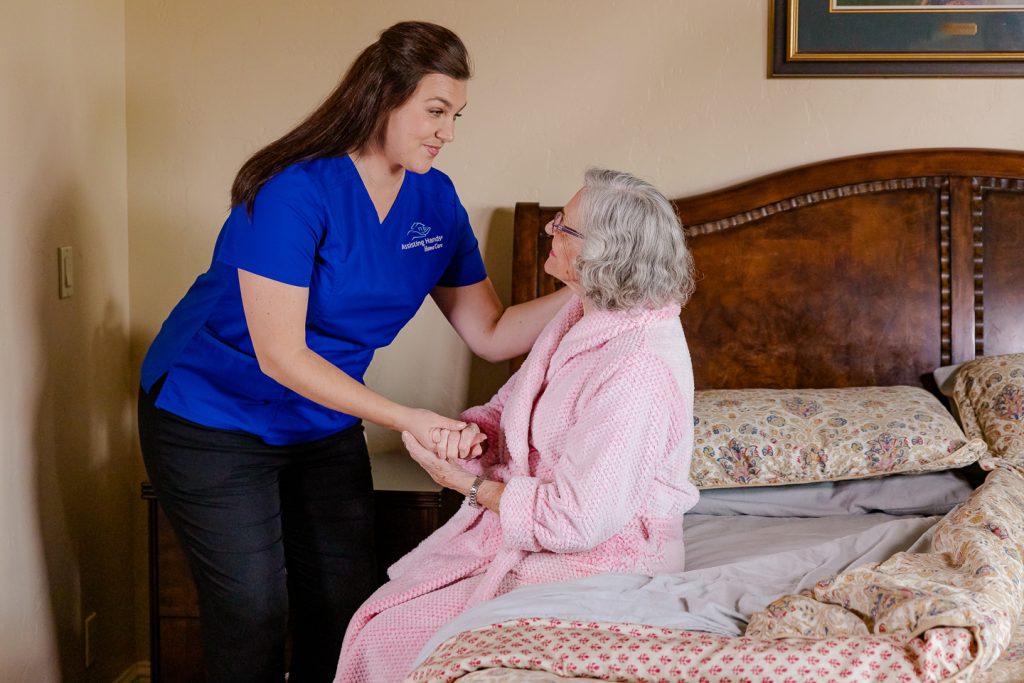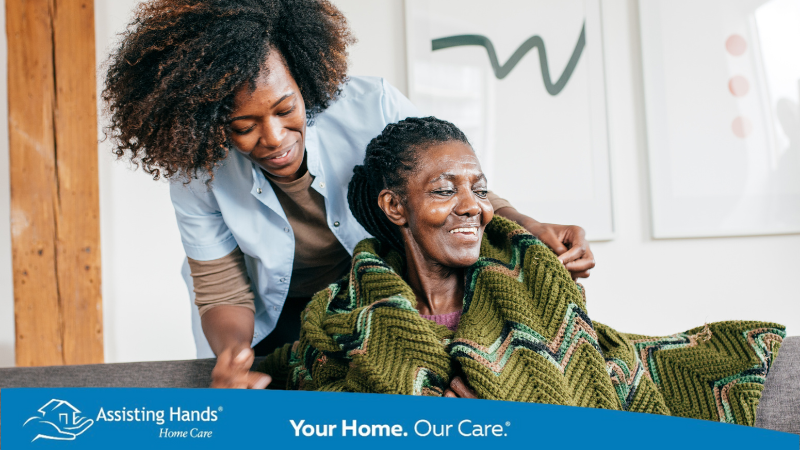
Many seniors are active and lead fulfilling lives. However, the aging process can introduce changes to physical and cognitive health. A decline in a senior’s ability to live independently should prompt families to consider an elder care professional, such as a personal care aide.
Aging in place is preferred by the majority of older people. Living at home, as opposed to residing in a nursing home or assisted living facility, offers seniors the benefits of living in a familiar setting and being close to friends or family. In-home care makes aging in place possible.
Families oftentimes step in to provide assistance to aging relatives. However, adult children juggle a career plus their own young families, making it difficult to provide the quality supervision and support that elderly individuals need at home. A personal care aide is the solution.
What is a personal care aide?
A personal care aide is a professional who tends to the daily, nonmedical needs of an elderly individual or person living with a disability. The personal care aide provides in-home support to those who are unable to practice the essential self-care activities on their own.
Unlike a licensed nurse, a personal care aide does not possess medical training. Rather, a personal care aide handles nonmedical care tasks. The personal care aide serves as a caretaker. A high school diploma is a sufficient credential to enter the field as a personal care aide.
What are the duties of a personal care aide?
1. Meal Preparation
A personal care aide will prepare nutritious meals for the care recipient. This professional is careful to prepare dishes that follow the senior’s dietary restrictions. Meal preparation services are needed when older people no longer possess the strength to cook for themselves.
2. Help with Eating
Personal care aides assist seniors who are unable to eat independently. In order to prevent choking during mealtimes, the aide will ensure the senior remains upright. Adaptive equipment, such as special plates or eating utensils, may be used to help the senior be independent while eating.
3. Household Chores
Seniors who are too fragile to maintain the home will benefit from the services of a personal care aide. This professional performs housekeeping services, such as light cleaning and doing laundry. Living in a clean and hygienic home improves the senior’s quality of life.
4. Running Errands
Personal care aides run the errands that seniors are no longer able to independently do. The aide may pick up the senior’s prescription medications from the pharmacy, for instance. The aide will also shop for fresh groceries, ensuring the fridge is stocked with nutritious produce.
5. Personal Hygiene Assistance
Maintaining personal hygiene is critical to a senior’s health as well as confidence, especially in social settings. A personal care aide provides discreet assistance with all personal hygiene tasks. The care recipient receives daily help with bathing, toileting, dressing, and grooming.
A frail senior should never stand alone in a shower. The personal care aide supports the senior throughout the bath, ensuring safety and comfort. If a bed bath is more appropriate, the personal care aide will bathe the senior in bed, reducing his risk of falling in the tub.
Mouth hygiene is a responsibility handled by personal care aides. The professional assists the senior with brushing teeth and flossing. Denture care is provided and includes help with removing dentures, cleaning, and reinserting them. The aide assesses the health of the senior’s teeth and gums.
6. Transfer Assistance
Some seniors require help with transferring to a sitting position in bed. Being seated in bed may be necessary when eating, meeting with visitors, or engaging in other activities. Aides ensure the senior slowly rises to a seated position without becoming dizzy or feeling faint.
Rising to a standing position may cause a senior to feel dizzy. A personal care aide supports the elderly individual as he begins to stand. The aide waits one to two minutes to ensure the senior feels steady on his feet and his body can adjust to a standing position.
7. Ambulation Support
Older adults may need help with walking, even short distances. Walking promotes strength and endurance, making it vital that seniors walk regularly. Personal care aides assist the senior with wearing shoes, using a cane or walker, and encouraging breaks when the senior appears tired.
Personal care aides are important in helping the elderly complete the activities of daily living (ADLs). The professional encourages the senior to perform the ADLs as independently as possible in efforts to promote confidence and self-esteem. The aide readily provides support when needed.
A personal care aide provides much more daily assistance than the aforementioned duties. Aides support seniors with shaving, incontinence issues, and turning in bed (to prevent bed sores), for example. When your elderly loved one needs help at home, consider Assisting Hands Home Care.

Our reputable home care agency is well-known for providing exemplary elder care services. Professional caregivers from our team support seniors in the comfort of home. We assist care recipients with all the activities of daily living. Our compassionate care improves the quality of life for seniors.
While our caregivers handle all the aforementioned responsibilities, we also offer specialized care. Our nonmedical care options include post-surgical care, Alzheimer’s and dementia care and hospice home care. We are available for live-in and 24-hour care. Respite care is a flexible care option, too.
Caregivers from Assisting Hands Home Care tend to the physical as well as emotional needs of seniors in our care. We are reliable companions, building bonds with the people we serve. Seniors enjoy participating in conversations, games, and hobbies with our companion caregivers.
Families with elderly loved ones in need of extra support at home will find invaluable help from Assisting Hands Home Care. Our caregiving professionals are available to seniors in Naperville, Glen Ellyn, Lisle, Warrenville, Wheaton, Illinois and surrounding areas. Call us at (630) 634-9316 to schedule a complimentary in-home consult
















